Hey Theology Nerds,
America stands at a crossroads. Political polarization has reached fever pitch, tearing apart families, churches, and communities. The constitutional ideals of forming "a more perfect union" and ensuring "domestic tranquility" seem like distant dreams as we witness democracy itself under strain. But what if the solution isn't found in political strategy or compromise, but in a radical reimagining of what it means to love our enemies?
Dr. Marvin Wickware, Associate Professor of Church and Society and Ethics at the Lutheran School of Theology at Chicago, delivered a provocative lecture for our online summit Democracy in Tension: Navigating the Interlocking Crises of Democracy & Religion, which turns conventional wisdom about political healing on its head.
His message: Christians must stop pretending they don't have enemies and start learning how to love them properly.
The Roots Run Deeper Than Politics
Wickware argues that today's political polarization—whether framed as Democrat versus Republican, progressive versus fascist, or liberal versus conservative—is merely the surface manifestation of something far more fundamental. "Contemporary political polarization is built on interracial enmity," he explains, tracing current divisions back to the persistent exclusion of certain groups from "We the People."
This exclusion isn't new. From slavery to land theft to unjust immigration policies, America has always struggled with the gap between its constitutional ideals and the reality of who gets to participate in democracy. Today's political battles, Wickware suggests, are the latest iteration of this centuries-old struggle between those who seek to exclude others from healthcare, education, voting rights, and basic dignity, and those who fight for inclusion.
Understanding this connection between racial and political enmity is crucial for Christians who want to respond faithfully to Jesus's command to "love your enemies." It means recognizing that the stakes go far beyond partisan politics—they touch the very soul of American democracy.
The Enemy Within Our Own Hearts
One of Wickware's most challenging insights is his rejection of the common Christian tendency to deny that we have enemies at all. Many believers, when faced with the command to love their enemies, respond by insisting they don't hate anyone or by pointing to their friendships across political or racial lines as proof that enmity doesn't exist.
This response, while well-intentioned, misses the point entirely. Wickware introduces the concept of "structural enmity"—antagonisms built into the basic structure of American society that position people in competitive struggle with one another, regardless of personal relationships or individual intentions.
"You can be enemies with your friends if that's how a world structured by race positions you in relation to one another," he explains. "You can be enemies with the people you love most if they exist on the other side of racial difference, and you can certainly be enemies with your siblings in Christ, even as you work to dismantle the structures that try to tear you apart."
This structural understanding of enmity helps explain why good-hearted people on all sides of political divides can find themselves locked in seemingly irreconcilable conflict. We're caught in systems that pit us against the very people with whom we need to work together to achieve justice, tranquility, and liberty.
Beyond Self-Sacrifice: A New Model of Love
Wickware's most revolutionary proposal involves reimagining what it means to love our enemies. While many Christians instinctively turn to Martin Luther King Jr.'s model of self-sacrificing agape love, Wickware argues this approach has been distorted by decades of misuse. White Americans often perceive any decentering of their needs as tremendous sacrifice, while people of color are expected to offer endless patience rather than prophetic challenge.
Instead, Wickware proposes shifting from a focus on self-sacrifice to a focus on need. Drawing inspiration from Audre Lorde's concept of "eros"—a loving power that affirms the self while reaching out to others—he suggests we must learn to embrace our fundamental need for our enemies.
This isn't about becoming doormats or accepting mistreatment. Rather, it's about recognizing that "we cannot be our fullest selves, and we cannot achieve the society that we desire without them." It's about understanding that healthy love grows from acknowledging our mutual dependence, not from pretending we can flourish in isolation.
From Need to Desire to Mutuality
Wickware traces a path from need through desire to mutuality that mirrors human development. We enter the world utterly dependent on others for survival, grow into children who need nurturers and protectors, and ideally mature into adults who understand that interdependence, not independence, is the goal of human flourishing.
This progression presents a model for political engagement that transcends zero-sum power struggles. When we truly need our political opponents—not despite our differences but because of what they might contribute to a fuller vision of democracy—we can begin to desire their transformation rather than their destruction. This desire can then evolve into relationships of mutual care, forming the foundation for new political structures.
Practical Implications for a Divided Nation
What does this look like in practice? Wickware is clear that depolarizing love doesn't mean avoiding criticism or settling for surface-level civility. Instead, it requires:
Honestly naming our enemies while working to understand why we need them.
Calling for repentance from those committed to hateful allegiances while offering support to those working toward transformation.
Building relationships not just at the level of social niceties but at the level of shared power and mutual self-interest.
Engaging in practical organizing work that addresses both material and spiritual needs.
"We need to understand one another's material and spiritual needs and what we can do to meet those needs," Wickware explains. This means moving beyond symbolic gestures toward concrete action that demonstrates care for the communities and society we all inhabit.
A Faith Response to Political Crisis
Wickware's vision is admittedly challenging. He acknowledges speaking in "apocalyptic, world-overturning terms" and "the language of faith." But for Christians who believe that following Jesus should actually make a difference in the world, he offers a clear challenge: "Figure out who your enemies are, why you need them, and what it means to act like it."
This approach won't appeal to those seeking easy answers or quick fixes to America's political divisions. But for believers committed to the slow, steady work of healing communities and transforming society, it offers a theologically grounded path forward that takes both human brokenness and divine grace seriously.
As America grapples with threats to democratic norms and institutions, Wickware's message arrives at a crucial moment. His call to depolarizing love isn't just another strategy for political engagement—it's an invitation to participate in the kind of radical transformation that faith communities are uniquely positioned to foster.
The question remains: Are we ready to love our enemies not in spite of our differences, but because of what we might become together?
Join the Conversation
This lecture is part of a larger online summit bringing together scholars, activists, and concerned citizens to grapple with these challenges. In our interconnected world, the threats to democracy and pluralism are global, but so are the opportunities for building more just and open societies.
Whether you're a scholar studying these issues, an activist working for social change, or simply a citizen concerned about the future of democracy, this conversation offers essential insights for understanding our moment and charting a path forward.
The stakes couldn't be higher. We face a choice between post-liberalism's authoritarian nightmare and a renewed commitment to the principles that make diverse, democratic societies possible. The future of pluralism—and perhaps democracy itself—hangs in the balance.
We hope you'll join us for this critical conversation about the challenges facing our democratic institutions and the principles that might guide us toward a more just and open future.
REGISTER NOW to secure your place in this vital discussion about democracy's future.
Dr. Marvin E. Wickware, Jr. is Assistant Professor of Church and Society and Ethics at Lutheran School of Theology at Chicago. Wickware describes his research and writing as a way for him to work out the problems he has encountered while teaching and living in community with others. His experiences as a black man working in the predominantly white institutions of Duke Divinity School and a Presbyterian Church (USA) congregation led to his dissertation topic of racial reconciliation in U.S. churches. His first book entitled “Loving through Enmity: Healing the Broken Heart of Christian Antiracist Work” demonstrates that black and white U.S. Christians must recognize that our world positions them as enemies and explores the possibilities of love in light of that reality. His research draws on feminist theory and black studies and in his teaching he works to connect an understanding of theoretical and theological perspectives to the church’s engagement with pressing political and social issues, with particular attention to the roles played by emotion and affect. Wickware’s involvement in community organizing with The People’s Lobby also enriches his teaching and research.
REGISTER NOW for the “Democracy in Tension” Online Summer Summit!
Democracy today faces profound challenges – polarization, inequality, populist authoritarianism, and widespread cynicism are eroding the foundations of democratic life. Yet, what if democracy's greatest strength lies not in eliminating these tensions, but in productively embracing them?
Reimagine democracy as a space for productive tension—not uniform agreement.
Engage new tools to resist polarization, cynicism, and political despair.
Explore how religion and democracy can coexist in pluralistic societies.
Transform political enemies into adversaries through agonistic engagement.
Confront the forces eroding democratic life with bold, practical insight.
Connect with scholars and citizens committed to revitalizing democratic imagination.
ASYNCHRONOUS CLASS: All lectures will be released on Monday, July 28th. You can participate fully without being present at any specific time. Replays are available on the Class Resource Page.
COST: A course like this is typically offered for $250 or more, but we invite you to contribute whatever you can (including $0) to help make this possible for everyone!
If you appreciate the work of Tripp Fuller and Homebrewed Christianity, please consider becoming a paid subscriber to the “Process This” Substack.
Join Us For Theology Beer Camp!
Theology Beer Camp is a unique three-day conference that brings together of theology nerds and craft beer for a blend of intellectual engagement, community building, and fun. This event features a lineup of well-known podcasters, scholars, and theology enthusiasts who come together to “nerd out” on theological topics while enjoying loads of fun activities.
Guests this year include John Dominic Crossan, Kelly Brown Douglas, Philip Clayton, Stacey Floyd-Thomas, Jeffery Pugh, Juan Floyd-Thomas, Andy Root, Grace Ji-Sun Kim, Noreen Herzfeld, Reggie Williams, Casper ter Kuile, and more!






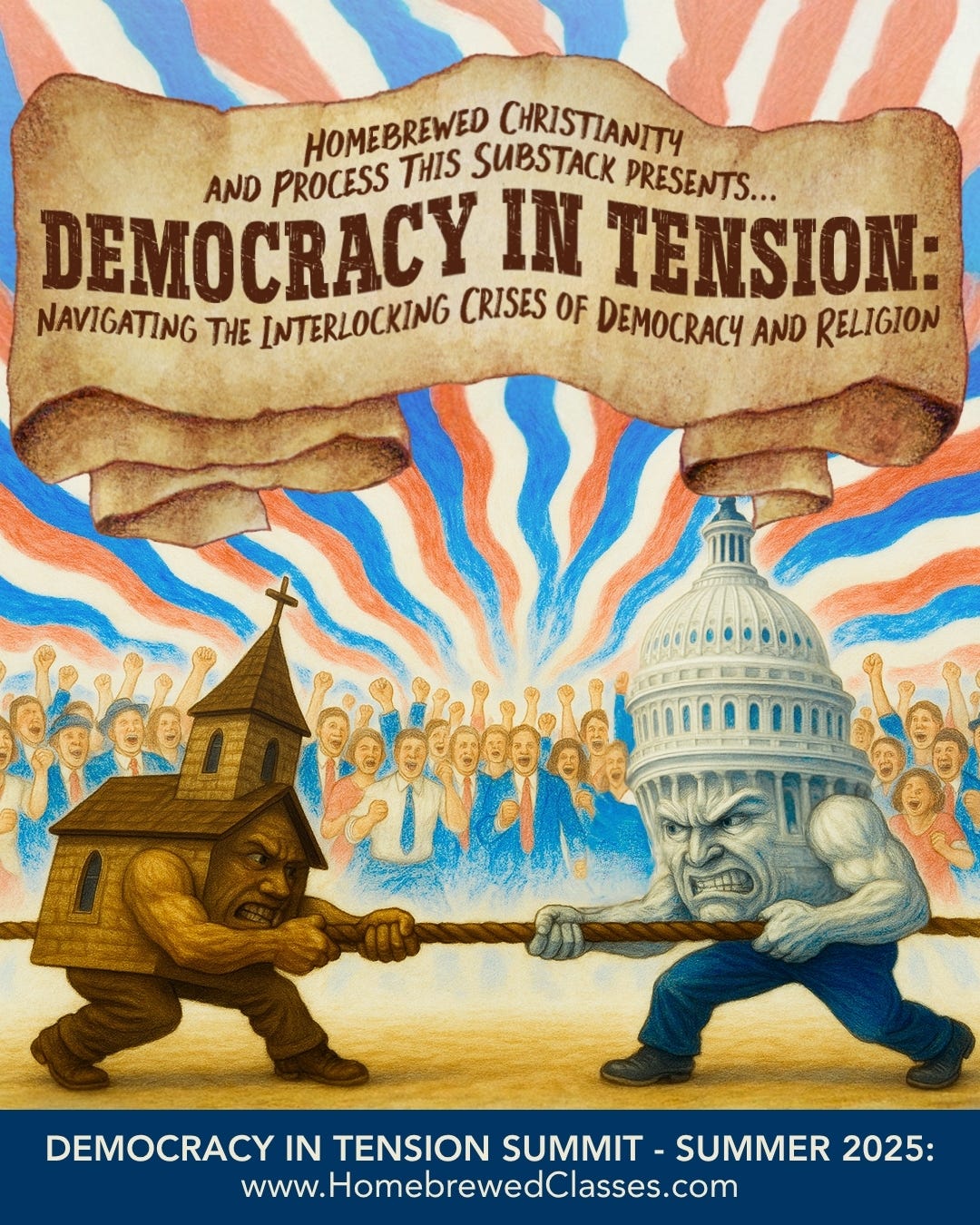
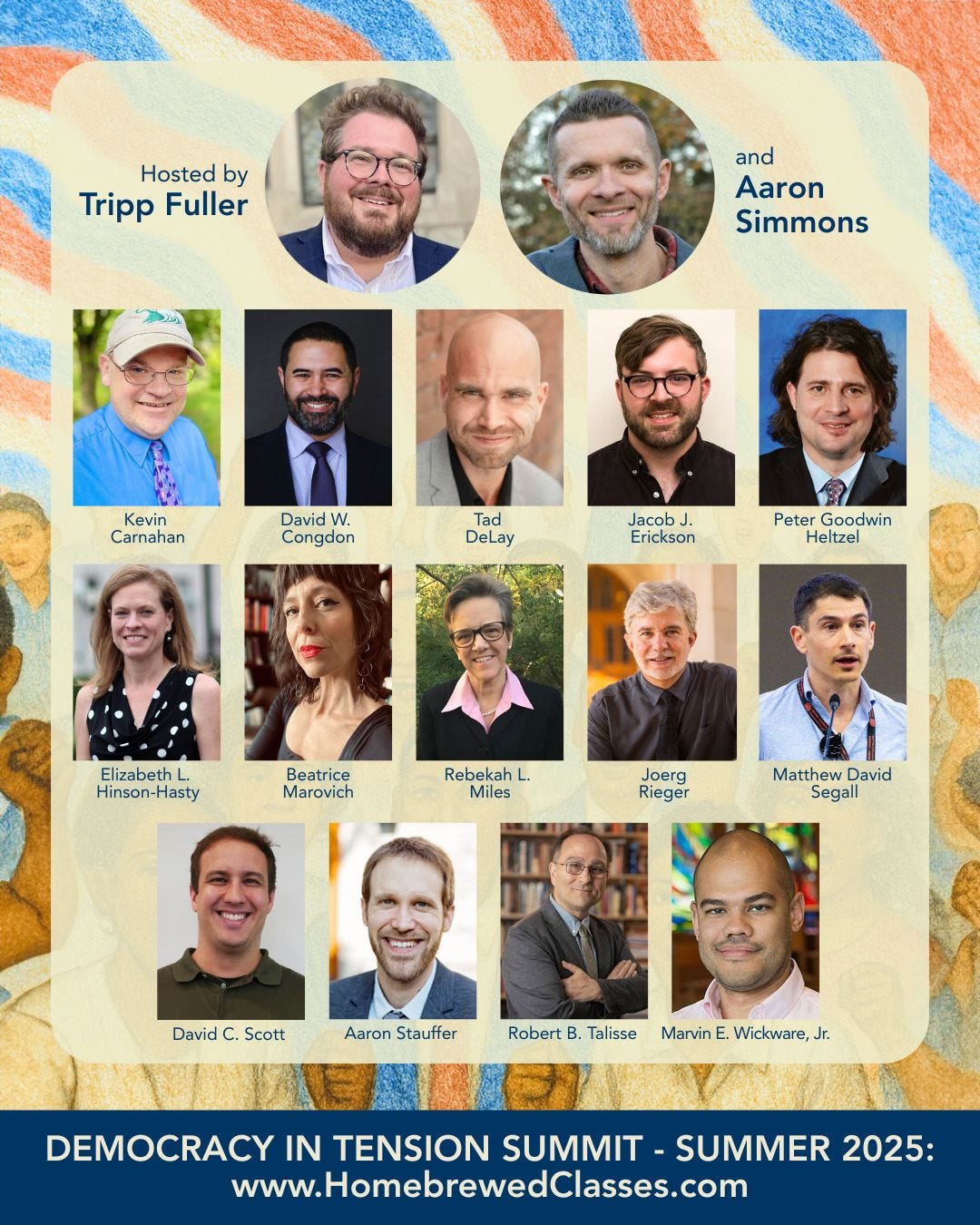
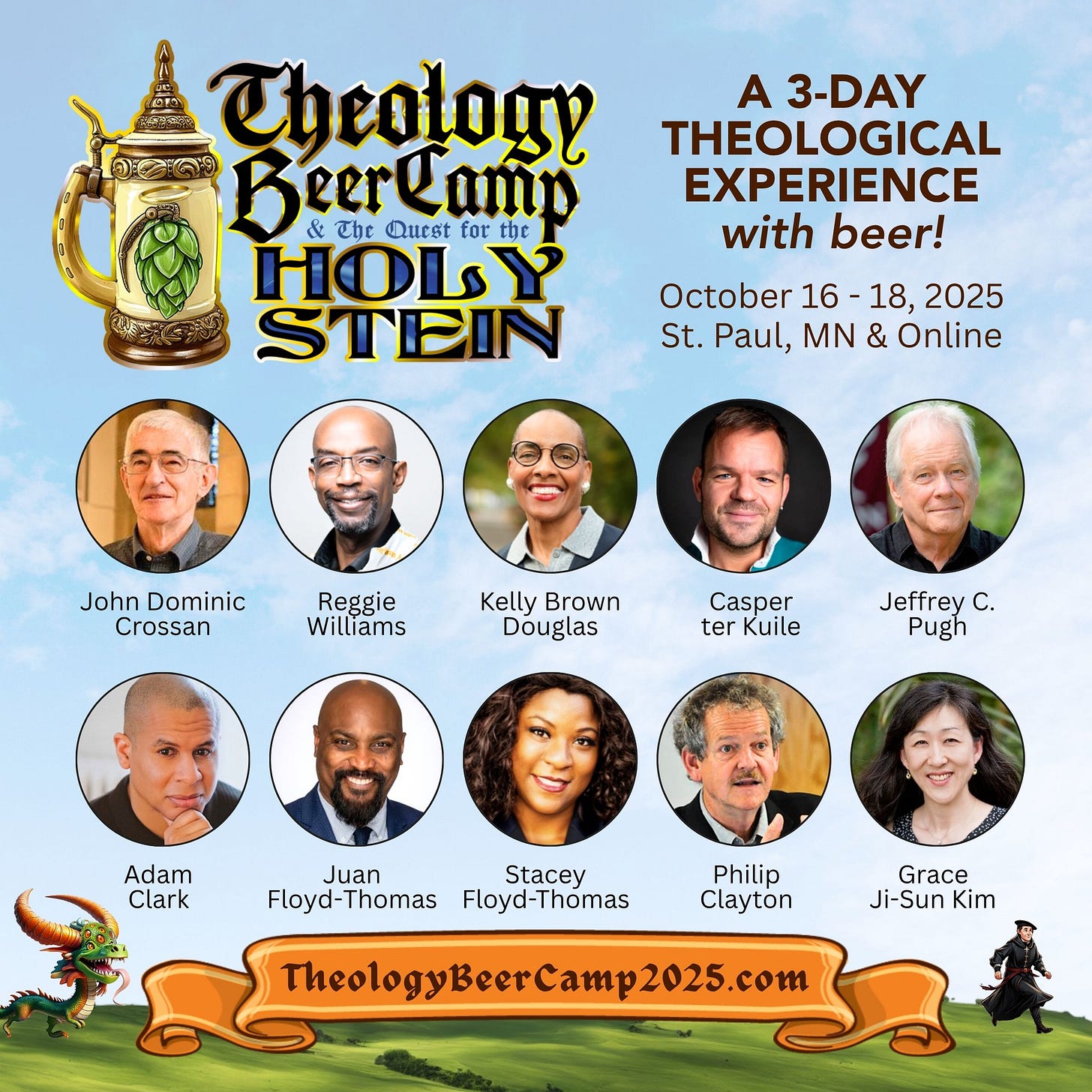
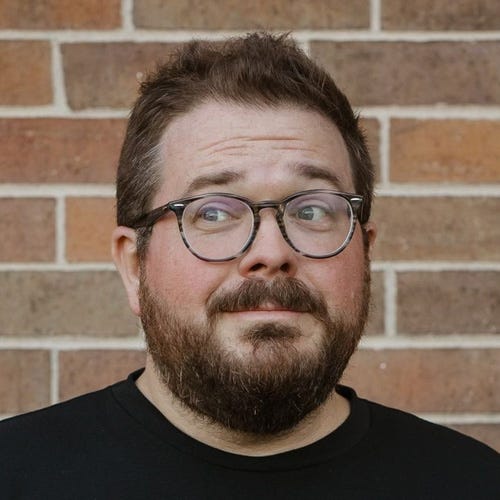






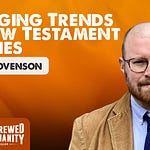

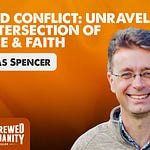

Share this post